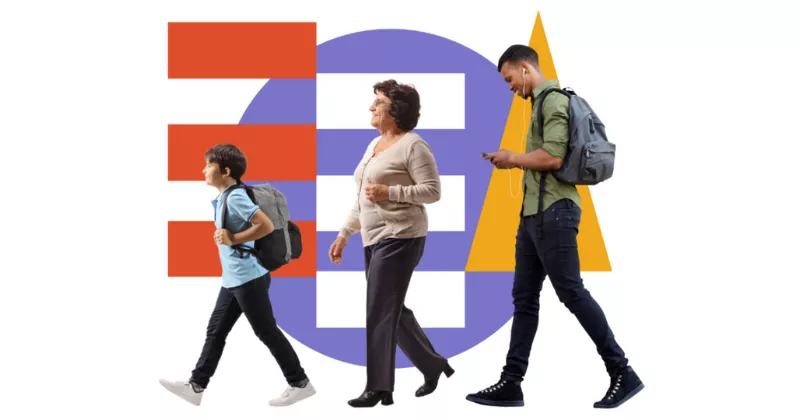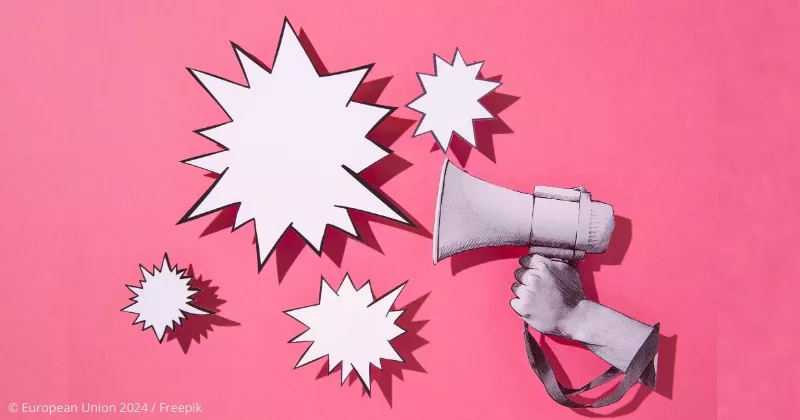Naslednja spletna razprava o aktivnem staranju in življenjskih prehodih

15. julija 2021 ob 10. uri bomo v živo prenašali razpravo o aktivnem staranju in življenjskih prehodih, ki jo bosta vodili Gina Ebner in Christin Cieslak iz EAEA v družbi Dine Soeiro in Susannah Chambers.
Predstavniki EAEA bodo Dino in Susannah vključili v razpravo o aktivnem staranju in življenjskih prehodih. Kaj mislimo, ko uporabljamo izraze »aktivno staranje« in »življenjski prehodi«? Kakšne so potencialne možnosti in izzivi, ki se lahko pojavijo ob aktivnem staranju in med življenjskimi prehodi?
Teme
Naši gostje bodo govorili na ravni posameznika in na evropski ravni.
Ogledali si bomo tudi trenutno stališče aktivnega staranja v Evropi in raziskali, ali in kako EU trenutno podpira aktivno staranje in življenjske prehode. Razprava se bo osredotočila tudi na nova spoznanja in znanja, ki jih prinašajo primeri dobrih praks o tem, kako spodbujati aktivno staranje na realističen, neidealiziran način in ustvariti več medgeneracijske solidarnosti ter kohezije v Evropi.
- Kaj mislimo z aktivnim staranjem?
- S katerimi izzivi se srečujemo pri življenjskih prehodih?
- Kako je lahko medgeneracijsko učenje v podporo aktivnemu staranju in ob življenjskih prehodih?
Govorci
Dina Soeiro, članica direktivne komisije pri portugalskem združenju za kulturo in stalno izobraževanje (APCEP) in na novo potrjena članica upravnega odbora EAEA, Dina ima 22 let izkušenj izobraževalke kot profesorica na Politehničnem inštitutu v Coimbri.
Susannah Chambers je strokovnjakinja za družinsko učenje z 17-letnimi izkušnjami na področju oblikovanja in izvajanja medgeneracijskega učenja. Je pobudnica družinskega učenja; ki je navdušena nad močjo in edinstvenim potencialom družinskega učenja kot sredstva za podporo aktivnemu staranju in življenjskim prehodom. Ima 3 otroke in ima dvojno britansko-slovaško državljanstvo.
Rezervirajte termin!
Razprava bo potekala 15. julija 2021 od 10. ure po srednjeevropskem času s prenosom v živo, nato pa bo sledila pisna razprava, kjer so zaželeni in dobrodošli vaši prispevki, mnenja, komentarji in vprašanja. Pisno razpravo bo vodila EAEA.
Toplo vas vabimo, da delite svoje izkušnje, vtise, menja, izzive in pobude o aktivnem staranju, medgeneracijskem sodelovanju in solidarnosti ter življenjskih prehodih.
Komentarji so odprti vnaprej, od 2. julija 2021.
Komentar
Very true...
Donald, I love this phrase you've shared with this community...
"Yesterday’s child is today’s adult and tomorrow’s grandmother or grandfather."
Incredibly true! That's like the active ageing and life transitions equivalent of a phrase so often used in society and in Family Learning - "It takes a village to raise a child".
Active Ageing and Life Transitions
Hello,
Here is our contribution to this online discussion:
What do we mean by active ageing?
Active ageing is something that should happen throughout our lives, regardless of age. It means being able to have an active participation in society at any age, which requires conditions and opportunities to act this way. Obviously, it depends mainly on our knowledge and skills.
What is challenging about life transitions?
Life is made up of transitions that happen as the years go by. Digitalization, robotization, globalization, climate transition and migration flows increase the number of transitions we all have to face. So, currently, the challenges are much higher than those that existed a few years ago, and they also change more quickly.
So, from our point of view, the main challenges are:
- the need for updating of skills.
- the regular acquisition of new skills.
- adapting education and training systems to respond to new audiences and new skills needs.
- anticipating short- and medium-term qualification needs.
- greater involvement and responsibility of everyone (especially companies) for educational and training paths and learning outcomes.
- increasing motivation and awareness that it is important to learn throughout life, regardless of the level of education already held, age, work situation or social status.
How could Intergenerational learning help with Active Ageing and Life Transitions?
Intergenerational learning means sharing knowledge between the youngest and the oldest, which implies that everyone could teach and learn, at the same time.
Young people will be able to help older people deal with technologies in supporting the transitions that older people will have to make (between jobs, from employed to retired, etc.) and also in increasing their active ageing. Older people can teach younger people many soft skills valued today by the labour market, such as teamwork, entrepreneurial spirit, resilience, creative thinking or mastery.
Each generation has been marked by certain characteristics that, usually, are lacking in other generations. The sharing of knowledge and skills between generations will always be an asset for all generations, but for this to became a reality it is necessary to go beyond a mindset that generally discredit the skills held by the elderly (always considered obsolete) or make neglect of the lessons that young people bring with them (considered only from the perspective of their usefulness for the digital world).
Best regards,
EPALE NSS Portugal
Mutual learning...
Wonderful, Dora, how you've recognised that "...everyone could teach and learn, at the same time."
It's such a missed opportunity in adult education where we view learning of different generations as mutually exclusive, so I agree that being open to learning from other generations is essential.
How to strengthen the position of seniors?
In the past, older people were respected for their knowledge and experience. At present, due to the rapid development of technology, they rather need help from younger people.
Szeniorok
Az Aktív Időskorért Alapítvány pécsi munkája példaértékű, ajánlom a figyelmükbe.
Active ageing is a very…
Active ageing is a very important topic and it truly helps to be active. Ageing or retirement should not mean stopping everything.
Dobrý den, v jakém…
Dobrý den,
v jakém jazyce bude diskuse probíhat?
Děkuji za Odpověď.
Kateřina Pávková
jazyk diskuse
Dobrý den,
diskuse probíhá v angličtině. Zapojit se můžete napsáním komentáře v angličtině zde (Váš příspěvek na blog EPALE se zrovna perfektně hodí k tomuto tématu :)). Po diskusi hostů bude moderátor probírat vložené komentáře a diskutovat je.
Monika Smekalová, NSS Česko







The Concept and Rationale
If ageing is to be a positive experience, longer life must be accompanied by continuing opportunities for health, participation and security.
Active ageing is the process of optimizing opportunities for health,participation and security in order to enhance quality of life as people age.Active ageing applies to both individuals and
population groups. It allows people to realize their potential for physical, social, and mental
well being throughout the life course and to participate in society according to their needs,
desires and capacities, while providing them with adequate protection, security and care
when they require assistance. The word “active” refers to continuing participation in social, economic, cultural, spiritual and civic affairs, not just the ability to be physically active or to participate in the labour force. Older people who retire from work and those who are ill or live with disabilities can remain active contributors to their families, peers, communities and nations. Active ageing aims to extend healthy life expectancy and quality of life for all people as they age,
including those who are frail, disabled and in need of care. “Health” refers to physical, mental and social well being as expressed in the WHO definition of health. Thus, in an active ageing frame-
work, policies and programmes that promote mental health and social connections are
as important as those that improve physical health status.Maintaining autonomy and independence as one grows older is a key goal for both individuals and policy makers . Moreover, ageing takes place within the context of others – friends, work associates, neighbours and family members. This is why interdependence as well as intergenerational solidarity (two-way giving and receiving between individuals as well as older and younger generations) are important tenets of active ageing. Yesterday’s child is today’s adult and tomorrow’s grandmother or grandfather. The quality of life they will enjoy as grandparents depends on the risks and opportunities they experienced throughout the life course, as well as the manner in which succeeding generations provide mutual aid and support
when needed.